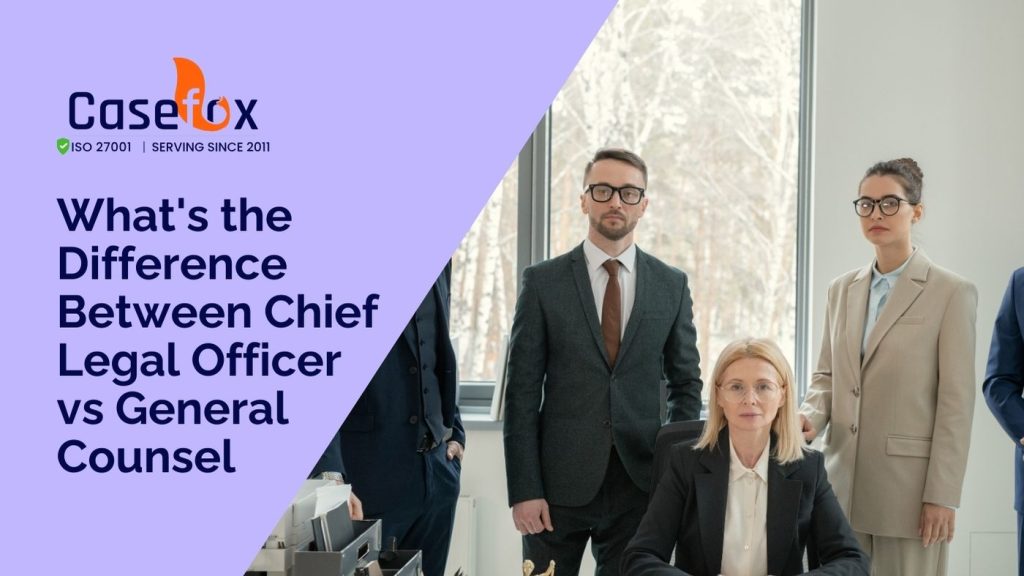Legal advisors in in-house teams are invaluable for the company. They are the individuals who understand all the ins and outs of the legal department and can streamline legal operations. They can assess potential risks and threats that a company might face and how to overcome them.
When it comes to managing your company’s legal department, you may be considering hiring a Chief Legal Officer (CLO) or General Counsel (GC). But you might be confused about whom to make part of your in-house legal team. So to solve this confusion we have curated this blog. We will be covering chief legal officer vs general counsel. If that is something you want to learn about, continue reading further.
Understanding the Role of Chief Legal Officer
The role of chief legal officer is typically the highest in the corporation. CLO is responsible for overseeing the entire legal function. Not just that, the role of CLO also extends to strategic management and direction of the company.
The CLO constantly collaborates with the executive team and other members to share legal insights, analyze trends, and help with the process of decision-making. It is to streamline business operations and ensure that the company’s strategy aligns with all the necessary legal regulations.
Understanding the Role of General Counsel
On the other hand, the General Counsel is the chief lawyer of the department or company. The role of the general counsel is to focus on all legal affairs and ensure compliance with legal regulations. The general counsel has to manage an in-house legal team, providing advice to the company’s executives, overseeing litigation processes and contacts.
Key Difference Between Chief Legal Officer vs General Counsel
Here’s the key difference between Chief Legal Officer and General Counsel
Strategic vs. Operational Focus

The general counsel in the legal department or company is responsible for operational work, overseeing the legal affairs of the department, and handling daily company requirements. GC has to provide legal advice, manage litigation and contacts, and be involved in functioning as much as possible.
However, the role of CLO is different from that, CLO is more responsible for strategic planning. They have a broader role and shape the overall direction of the company. CLO needs to understand the trends, and external environment for better decision-making in the team.
Risk Management
The general counsel has a more reactive way of dealing with the risk. They manage risks such as litigation disputes, compliance management with existing regulations, offering advice on legal matters, and more. They have to tackle immediate legal threats and develop an action place to mitigate risk.
While the approach of CLO when it comes to is more proactive. They have to integrate risk assessments with the strategic planning approach. CLO identifies internal and external risks and mitigates them with strategies. They work with various departments and ensure smooth functioning with a risk management approach.
Scope of Responsibilities
General counsel responsibilities are narrow in comparison to the CLO. They majorly focus on managing the legal issues and affairs of the department. They have to handle contracts, litigation processes, ensure regulatory compliance, and oversee legal tasks. Their role is critical when it comes to safeguarding the legal interest of the company.

But the CLO oversees a wide range of functions. This includes decision-making, risk management, mitigating potential risk, and ensuring adherence to both internal policies and external regulations. Additionally, the CLO represents the interest of the company and manages regulatory matters.
Executive Involvement
The General Counsel focuses more on the legal work and may also report to the CLO or CEO of the organization. Although the general counsel is a crucial part of any organization, their role in the executive team or decision-making is quite limited. Their main responsibility is to ensure that the legal in-house team operates efficiently and smoothly.
On the other hand, the CLO plays an important role in the decision-making process of the organization. They have to collaborate with the CEO, CFO, and other C-suite executives. They have to ensure all legal factors and regulations are considered by the team while functioning. CLO directly reports to the CEO of the company participates in board meetings, and is an integral part of the executive team.
Interaction with Stakeholders
The general counsel may only interact with the internal stakeholders of the company. This can include all managers, executives, employees, and other stakeholders. They provide all the required legal guidance and solutions. GC can sometimes also work with external stakeholders on certain special projects or cases. But their role focuses more on internal legal matters only.

On the other hand, CLO engages with the board of directors, investors, company regulators, and other external legal advisors. They have to represent the company at high-level meetings and discussions. Their interaction with internal stakeholders is less in comparison to general counsel.
Chief Legal Officer (CLO) Responsibilities:
- CLO has created a strategy for the company that aligns with the business goal of the company.
- They have to identify potential risks and mitigate the risks that can impact a company in any possible way.
- Represent the company in external, legislative, and regulatory matters.
- Ensuring the company’s governance in relation to any governance standard.
- Sharing crucial industry insights and advising the board of directors when necessary.
- Leading the legal department of the company.
General Counsel (GC) Responsibilities:
- GC has to provide legal advice to the team, company, employees, and directors on various issues.
- They oversee the process of litigation and handle all kinds of legal disputes.
- Review, draft, and negotiate contracts and agreements to protect the interests of the company.
- Ensure compliance with all legal requirements and industry standards.
- Manage the in-house legal and daily legal operations of the company.
The Bottom Line
Both CLO and GC play an important role in the functioning of the company and saving legal interests. But their scope of work and responsibilities is different. CLO is more involved in strategies and external matters, while GC is more about legal advice and an in-house legal team.
We have mentioned all the necessary things that you need to know about both GC and CLO. With this, you will have a clear understanding of their role.

